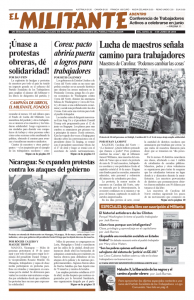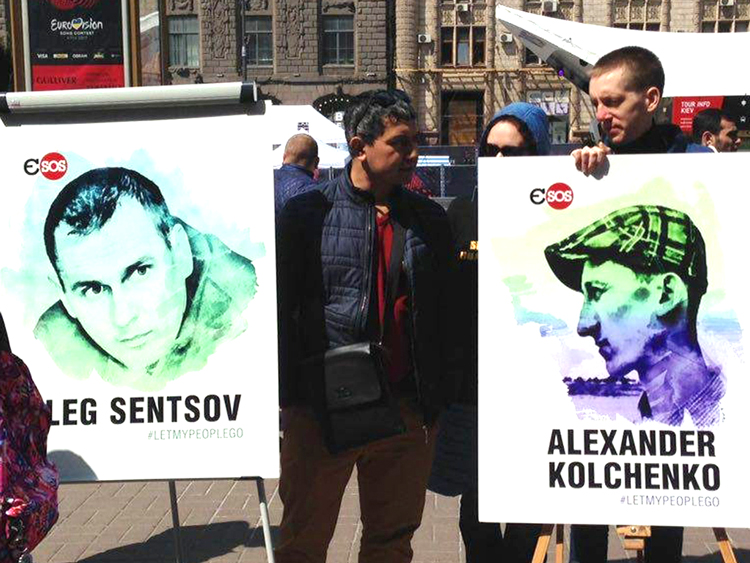Oleg Sentsov, an internationally known filmmaker and supporter of a Ukraine independent of Moscow’s control, was arrested in his home in Crimea shortly after the Russian government seized that province in 2014. This move came in response to the victory of the popular Maidan mass movement that brought down the pro-Moscow regime of Viktor Yanukovych in Ukraine a month earlier.
Sentsov was taken to Russia, framed up on false charges of terrorism and sentenced to 20 years in prison. He has maintained his support for Ukraine.
On May 16 Sentsov’s lawyer, Dmitry Dinze, released a letter he got from Sentsov in the Siberian Polar Bear prison, announcing he had begun a hunger strike.
“I, Oleg Sentsov, Ukrainian citizen, sentenced illegally by a Russian court and held in a prison in Labytnangi, declare a hunger strike, beginning 14 May 2018,” he wrote. “My sole demand is the release of all Ukrainian political prisoners held in the Russian Federation.
“Together to the end. Glory to Ukraine!” he said.
Sentsov demands the release of 64 Ukrainian political prisoners. Dinze said Sentsov had prepared for the hunger strike for a month and a half, eating smaller amounts of food, adjusting his body to starving.
The timing is no coincidence. The soccer World Cup, one of the largest sports events in the world, is due to begin in Russia in a month. “If I die before or during the World Cup, there will be publicity that will help other political prisoners,” Sentsov told his lawyer.
Prison officials have placed Sentsov in isolation and threatened to force feed him if his condition gets critical.
In addition to seizing Crimea, Moscow led an armed uprising in eastern Ukraine, taking over some of the Donbas region there. Working people have borne the brunt of the war. Thousands have been killed and wounded in fighting against the Russian-backed forces, a big chunk of the population is displaced, and coal mines and other factories and infrastructure have been seized or destroyed.
Opposed Moscow’s occupation
Sentsov immediately joined those opposing the occupation of Crimea. He delivered food supplies to Ukrainian army soldiers trapped in their barracks. The Russian navy had a huge base in Sevastopol, under a treaty with Kiev, and those troops were used to surround the Ukrainian forces.
He was arrested in May, along with three other opponents of Moscow’s seizure of Crimea, Alexander Kolchenko, Gennady Afanasiev and Oleksiy Chirniy. They were kept totally isolated for three weeks, during which all four said they were tortured.
Sentsov gave a detailed account about this and was threatened with 20 years behind bars if he didn’t confess. But neither he nor Kolchenko broke. They have maintained their innocence all along.
“I don’t know what your beliefs can possibly be worth if you are not ready to suffer or die for them,” Sentsov told the court in Rostov-on-Don in August 2015. He was sentenced to 20 years and Kolchenko to 10.
The state’s frame-up case was based on written statements from Afanasiev and Chirniy. But at the trial, Afanasiev retracted his “confession,” saying it had been gotten through torture. Chirniy wasn’t put on the stand because he refused to testify.
Sentsov denounced the frame-up. “A court of occupiers by definition cannot be just,” he told the court.
He also spoke out against the false propaganda Russian President Vladimir Putin was pushing about Ukraine. “Putin is great. There are fascists in Ukraine. Russia is never wrong,” he said sarcastically to the judge. “This is very good propaganda.”
“We also had a criminal regime, but we came out against it,” he said, talking about the Maidan. “In the end, we won.”
Sentsov’s case has gotten publicity internationally and he has received substantial support. In February a “Worldwide Day of Action for Oleg Sentsov” was held in cities around the world. Pedro Almodovar, Mike Leigh, Wim Wenders and other prominent filmmakers have called for his release.
Sentsov backed by Crimean Tatars
Also framed up and imprisoned in Russia are Akhtem Chiygoz and Ilmi Umerov, deputy heads of the Mejlis, the national assembly of Crimean Tatar people, which has been a target for repression by the Russian government’s occupying troops. In October they won their freedom and pledged to fight for the release of other Ukrainian citizens in Russian jails.
The Tatars are the indigenous people of Crimea. In May 1944 the Stalinist regime in Moscow deported every single Tatar from Crimea, falsely accusing them of collaborating with Nazi occupation troops. As the Soviet Union was collapsing in the 1980s, Tatars started returning to their homeland. They have resolutely opposed Moscow’s annexation of Crimea.
Chiygoz and Umerov especially stressed the case of Sentsov, who had been transferred to Siberia a few weeks earlier. Conditions are much harsher in the gulag prison there than where he had been held, a punishment meted out by the Russian government for his refusal to break.
In a letter smuggled out in September 2016, Sentsov said he was a “nail that will not bend.”
“For three years I’ve been sitting in a Russian prison. For those three years a war has been conducted against my country,” he wrote. “The enemy is fighting like a coward, vilely, pretending he’s got nothing to do with this. Nobody believes him.”


